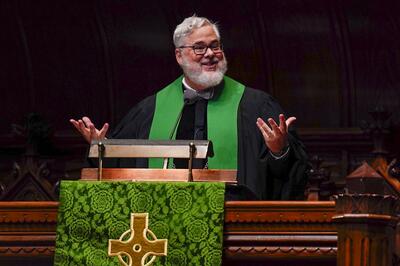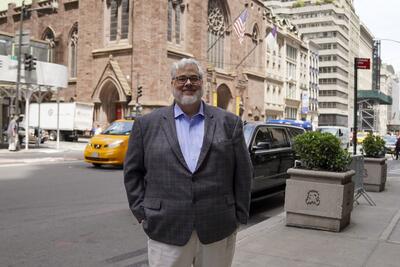By Ray Waddle
In the spiritual churn of a modern-day biblical Corinth—New York City, that is—the Rev. Dr. Scott Black Johnston ’89 M.Div. speaks up for mainline Christian vitality and classic Christian virtues. And if he gets a chance to pray with Donald Trump, well, he’ll do that too.
 In fact it happened in January 2017 when Trump was still president-elect—in Trump’s office in Trump Tower. Black Johnston and clergy colleague Patrick O’Connor met the soon-to-be president for a 10-minute prayer session. Results were mixed. Trump assumed they were pro-Trump evangelicals. Black Johnston and O’Connor assured him there was a whole spectrum of Christians and other people of faith out there who didn’t share the ideology of that particular religious voting bloc.
In fact it happened in January 2017 when Trump was still president-elect—in Trump’s office in Trump Tower. Black Johnston and clergy colleague Patrick O’Connor met the soon-to-be president for a 10-minute prayer session. Results were mixed. Trump assumed they were pro-Trump evangelicals. Black Johnston and O’Connor assured him there was a whole spectrum of Christians and other people of faith out there who didn’t share the ideology of that particular religious voting bloc.
“In the prayer, we did not want to back him into a corner and berate him, but we wanted to be clear in asking God to help him to serve all the nation’s people and be open to the plight of immigrants, environmental concerns, issues of reconciliation and justice, ideas we think many American Christians care about,” recalled Black Johnston, minister at 2,000-member Fifth Avenue Presbyterian Church, which is located almost directly across the street from Trump Tower.
“We wanted to put a different sort of faith on his radar screen. Sadly, I don’t think our words registered with him at all, but we had to try.”
There was something fateful about the encounter. Both Donald Trump and Scott Black Johnston’s father were baptized at the same church, First Presbyterian Church in Jamaica, Queens, N.Y. The Rev. O’Connor is now minister there. Black Johnston’s church on Fifth Avenue is catty-corner to Trump Tower. Some of Trump’s children attended Fifth Avenue church vacation Bible school when they were young.
Nevertheless, Black Johnston’s and O’Connor’s short prayer time with President-Elect Trump whipped up a gust of criticism from some Presbyterians and others. Critics said the two ministers should never have dignified Trump in this prayerful way, or at least they should have used their moment to blister him over his public policies and personal morals.
Even so, both clergymen have said they’d do it again if given the chance: Christians have a responsibility to make all presidents aware of gospel imperatives, care for the vulnerable, love of neighbor, the work of reconciliation. Writing later, Black Johnston characterized his own congregation in this way: “We vote in different ways, and yet, by the grace of God, we worship as one people. We believe that our unity depends not on lockstep agreement, but on the Christ who claims us and calls us to care for the poor, the sick, and the imprisoned.”
The Trump encounter had an unanticipated effect at Fifth Avenue Presbyterian. It helped ignite a round of congregational conversations about what it means to do the right thing, practice a healthy spiritual politics, and tackle the toughest gospel commandment of all: love your enemies. An educator at heart—an author on homiletics, a former professor—Black Johnston was keen to launch a series of discussions on the ancient Christian virtues: temperance, justice, prudence, courage, faith, hope, love. The aim was to clarify the congregation’s moral compass in precarious times, and, not least, help believers get in touch with their own everyday anger, vanity, and ethical apathy. Black Johnston’s recent book, Elusive Grace: Loving Your Enemies While Striving for God’s Justice (Westminster John Knox, 2022), expands on the themes they covered.
‘On the lookout for God and good conversation’
Black Johnston, born in New Jersey, moved at age 10 with his family to a farm in central Minnesota. He went to college at St. Olaf in Northfield, Minn., and, after YDS, he earned a Ph.D. from Princeton Theological Seminary. His vocational life has taken him from Texas to Georgia to New York. For ten years he was professor of homiletics at Austin (Texas) Presbyterian Theological Seminary before he became a parish minister in Atlanta (2003-2008). He has been senior minister at Fifth Avenue since 2008. On his church webpage he describes himself as a family man, a writer, a sports fan who likes red wine and dark beer and is ever in search of the world’s best pizza. (“New Haven did that to me!”) He also declares: “I read a lot. My laugh is too loud. I am into reformed theology, parables, psalms, and prayers. I write about the challenges, absurdities, and joys of an urban faith. I am always on the lookout for God and good conversation. Let me know whenever you spot them.”
These past 15 years have made him a close observer of the jostle between faith and commerce and ambition and prayer in the Empire State’s great global metropolis.
 “Seriously, when I arrived here, I couldn’t figure out if New York was the least religious place I’ve ever lived in—or the most,” he said recently. “Here the derision for all things religious, especially Christianity, is out in the open. At the same time, I’m regularly assailed by street corner preachers trying to save my soul or trying to recruit me for other faiths. It is a fascinating stew. I compare New York City to Corinth in the New Testament—there’s a lot going on, the conversation is rich, complicated, and often spiritual at a time when the church is without political power and Christianity is just one of many choices. You can get your head snapped off mentioning religion, and then turn around and discover someone who really wants to engage in questions of God.”
“Seriously, when I arrived here, I couldn’t figure out if New York was the least religious place I’ve ever lived in—or the most,” he said recently. “Here the derision for all things religious, especially Christianity, is out in the open. At the same time, I’m regularly assailed by street corner preachers trying to save my soul or trying to recruit me for other faiths. It is a fascinating stew. I compare New York City to Corinth in the New Testament—there’s a lot going on, the conversation is rich, complicated, and often spiritual at a time when the church is without political power and Christianity is just one of many choices. You can get your head snapped off mentioning religion, and then turn around and discover someone who really wants to engage in questions of God.”
His sermons try to take the measure of the city’s challenges—the competitiveness, the stress, the inequality, the beatdown of failure, but also the deep spiritual exertion he sees. Decades ago, Fifth Avenue church would have been regarded a prestigious social address. Christianity lacks that kind of cultural cachet today, but as a result, he said, parishioners are there not because of social expectation but because they want to be. This makes for a higher level of intention and commitment. Worshipers manage to trek from all five boroughs and the tri-state region to attend. The church is the scene of a large number of adult baptisms annually. In short, he said, we have entered the era of the “decentered church,” which gives believers and seekers a new freedom to revisit foundational questions about Jesus, ethics, and the good life and to speak to structures of power with fresh urgency and skepticism.
“One of our fastest-growing ministries is to 20-somethings,” Black Johnston said. “More than 100 are connected to this church. These young people come to New York from all over the country. They’ve moved here and are trying to make it. And they’ve found their way to Fifth Avenue church, bringing a deep interest in God, asking good questions. Today, when so much of the content of Christian stories and songs and history has been lost, we’re focused on education. I’m always trying to help folk build a basic foundation of Christian knowledge. People seem hungry for it, excited by it. So, while the mainline church is experiencing a lot of uncertainty these days, I’m deeply hopeful about the next generation.”
Articulating a positive vision
To retain or regain vitality, though, mainline churches will need to move beyond habits of merely criticizing currently dominant expressions of cultural Christianity or Christian nationalism, he argued. It’s time to speak up positively about what a more authentic Christian faith and practice should look like.
“There is so much going on in the world that is inconsistent with the gospel of Jesus Christ, that preachers have spent a good bit of pulpit time in recent years offering prophetic criticism,” said Black Johnston, a member of the YDS Dean’s Advisory Council. “This needed to happen, but too often we have stopped after offering a critique and have failed to extend a positive and constructive vision for our people. It’s not enough to say, ‘We’re not them. Amen.’ I’m more and more drawn to Martin Luther King’s understanding of the beloved community: we need to figure out how to hold onto each other in gracious ways. In this country, that’s mighty hard work. It’s so easy to get crosswise with each other. King knew this. He often spoke of God’s command to let go of the anger and hatred and to embrace grace—to embody grace that frees us from the desire for revenge and makes both peace and justice possible.”
Black Johnston’s Elusive Grace takes up the endeavor of “retraining our hearts” for the pursuit of loving Jesus, mercy, and truth, finding spaces of transcendence, unity, and courage while rooting out self-righteousness and judgmentalism.
“Our idea was, ‘OK, let’s take these classic Christian virtues, dust them off, and look at them in biblical context and theological history—but then bring them into the contemporary world,’” he said. “The hope is to prepare ourselves to receive the gifts of the Spirit and help us make meaningful progress on critical concerns facing us all.”
These include the fight against misogyny, racism, and economic injustice—by promoting civic virtues that inspire truth-telling, mutual regard, respect for diversity, and life-changing service.
The chapter on love of enemies, for instance, admits how impossible Jesus’ command sounds, yet a commitment to it opens up pragmatic paths. Black Johnston writes: “First: we should love our enemies because we are fickle … Second: we should love our enemies because the alternative, hatred, will eat us alive … Third: we should love our enemies because ideas and people are not the same thing … Fourth: we should love our enemies because God really is out to save the whole world.”
In a recent podcast, he elaborates: “It’s the most radical challenge that Jesus puts in front of believers. But it’s critically important for us at all times, especially right now. If we don’t love those with whom we disagree, it is immediately apparent to them. It shuts down conversation, and it ends up isolating us in a little angry silo, without ever moving the needle on getting things done.”
An emphasis on the inescapable doctrine of love and grace animates Black Johnston’s theological aims and attentions as he preaches at Fifth Avenue, initiates racial reconciliation efforts there, or travels as a guest lecturer at Christian churches and interfaith conferences. Christians ought to just stay silent and withdraw if love doesn’t “coat our every word,” he writes.
“We have to learn (or relearn) to love as Jesus taught us to love—with all our hearts, with all our souls, and with all our minds. It’s time to get started.”